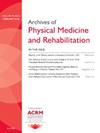Decline in Physical Function Is Associated with Cognitive Impairment and Quality of Life in Pancreatic Cancer Patients Undergoing Chemotherapy 4359
IF 3.6
2区 医学
Q1 REHABILITATION
Archives of physical medicine and rehabilitation
Pub Date : 2025-04-01
DOI:10.1016/j.apmr.2025.01.042
引用次数: 0
Abstract
Objectives
(1) To investigate changes in physical function among older patients with pancreatic cancer receiving chemotherapy at baseline, 2-, 4-, and 6-month intervals, and (2) to observe the associations among physical function, cognitive function, and quality of life (QoL) in patients with pancreatic cancer.
Design
A 6-month longitudinal follow-up study.
Setting
Medical Center at National Cheng Kung University, Tainan, Taiwan.
Participants
A total of 117 patients with pancreatic cancer (N=117; 57 men, 60 women) with a mean age of 72.20±5.95 years and body mass index of 22.65±3.37 were enrolled.
Interventions
Not applicable.
Main Outcome Measures
Physical functional tests, including maximum grip strength, the 2-Minute Step Test, and the Timed Up and Go (TUG), were conducted by a licensed physical therapist at baseline (before chemotherapy), 2-, 4-, and 6-month during chemotherapy. Cognitive function and QoL were assessed using the total score of the Montreal Cognitive Assessment and the European Organization for the Research and Treatment of Cancer Quality of Life Questionnaire, respectively. One-way analysis of variance and Pearson correlation coefficient were employed to detect changes in physical function and assess correlations among the primary outcomes with a significance level of P<.05.
Results
Throughout the chemotherapy course, a decline in physical functions was observed in maximum grip strength (F=4.410, P=.005) and Timed Up and Go (F=11.055, P<.001), with no significant changes in 2-Minute Step Test (F=1.248, P=.292). Additionally, we noted that reduced maximum grip strength is associated with Montreal Cognitive Assessment scores at baseline and 4 months (r=0.327 and 0.340, respectively) and QoL at 6 months of chemotherapy (r=0.260). Meanwhile, an increased Timed Up and Go time exhibited a correlation with both Montreal Cognitive Assessment scores and QoL at baseline (r=−0.432 and −0.256), 4 months (r=−0.349 and −0.245), and 6 months of chemotherapy (r=−0.289 and −0.373).
Conclusions
This study presents evidence of decreased physical function in older adults with pancreatic cancer undergoing chemotherapy. Furthermore, we identified an association between declined physical function and cognitive impairment as well as QoL in patients with pancreatic cancer. Therefore, monitoring physical status, cognitive function, and QoL is crucial in clinical rehabilitation, particularly in the early stages of chemotherapy. Additionally, we recommend integrating rehabilitation strategies that combine both physical and cognitive training into cancer rehabilitation programs. This approach may contribute to enhancing coping mechanisms and the overall QoL for older adults with pancreatic cancer undergoing chemotherapy.
Disclosures
none.
接受化疗的胰腺癌患者身体功能下降与认知障碍和生活质量相关4359
目的(1)了解老年胰腺癌化疗患者在基线、2个月、4个月和6个月期间身体功能的变化;(2)观察胰腺癌患者身体功能、认知功能和生活质量(QoL)之间的关系。设计6个月的纵向随访研究。国立成功大学医疗中心,台南,台湾。参与者共117例胰腺癌患者(N=117;男性57例,女性60例),平均年龄72.20±5.95岁,体重指数22.65±3.37。InterventionsNot适用。主要结果测量物理功能测试,包括最大握力、2分钟步法测试和定时向上和向前(TUG),由有资格的物理治疗师在基线(化疗前)、化疗期间2、4和6个月进行。认知功能和生活质量分别采用蒙特利尔认知评估和欧洲癌症研究与治疗组织生活质量问卷的总分进行评估。采用单因素方差分析和Pearson相关系数来检测身体功能的变化,评估主要结局之间的相关性,显著性水平为P<; 0.05。结果在整个化疗过程中,最大握力(F=4.410, P= 0.005)和Timed Up and Go (F=11.055, P= 0.001)的身体功能下降,2分钟步距测试(F=1.248, P= 0.292)无显著变化。此外,我们注意到最大握力的减少与基线和4个月时的蒙特利尔认知评估评分(r分别=0.327和0.340)和化疗6个月时的生活质量(r=0.260)相关。同时,增加的Timed Up和Go时间与蒙特利尔认知评估评分和基线生活质量(r= - 0.432和- 0.256)、化疗4个月(r= - 0.349和- 0.245)和化疗6个月(r= - 0.289和- 0.373)相关。结论:本研究提供了接受化疗的老年胰腺癌患者身体功能下降的证据。此外,我们发现胰腺癌患者的身体功能下降与认知障碍和生活质量之间存在关联。因此,监测身体状况、认知功能和生活质量在临床康复中至关重要,特别是在化疗的早期阶段。此外,我们建议将身体和认知训练相结合的康复策略纳入癌症康复计划。这种方法可能有助于增强老年胰腺癌化疗患者的应对机制和总体生活质量。
本文章由计算机程序翻译,如有差异,请以英文原文为准。
求助全文
约1分钟内获得全文
求助全文
来源期刊
CiteScore
6.20
自引率
4.70%
发文量
495
审稿时长
38 days
期刊介绍:
The Archives of Physical Medicine and Rehabilitation publishes original, peer-reviewed research and clinical reports on important trends and developments in physical medicine and rehabilitation and related fields. This international journal brings researchers and clinicians authoritative information on the therapeutic utilization of physical, behavioral and pharmaceutical agents in providing comprehensive care for individuals with chronic illness and disabilities.
Archives began publication in 1920, publishes monthly, and is the official journal of the American Congress of Rehabilitation Medicine. Its papers are cited more often than any other rehabilitation journal.

 求助内容:
求助内容: 应助结果提醒方式:
应助结果提醒方式:


